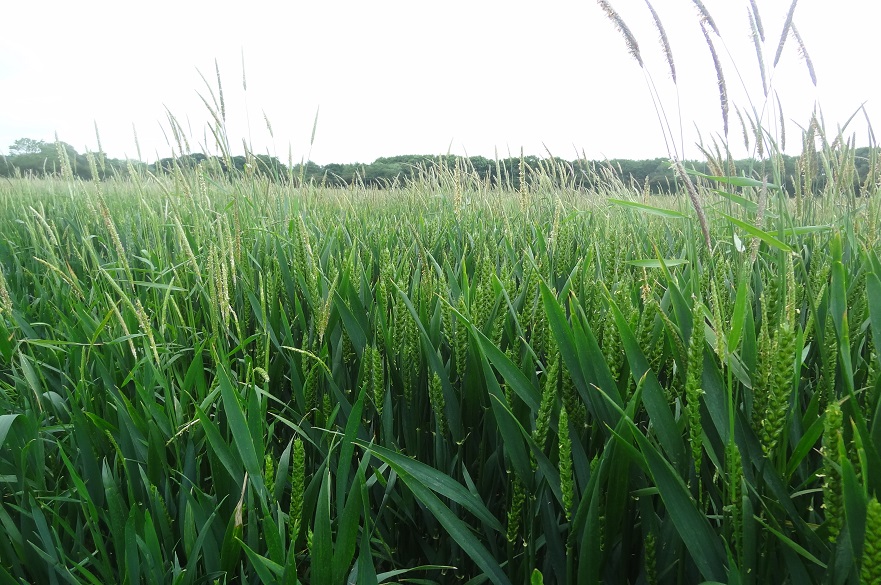Scientists trialling new approach to tackle weed infestation, herbicide resistance and crop losses
A new study is seeking to tackle weed infestation and herbicide resistance by detecting and quantifying arable weed seeds in the soil using environmental DNA technologies.
By Dave Rogers | Published on 15 December 2022
Categories: Press office; Research; School of Animal, Rural and Environmental Sciences;

Environmental scientists at Nottingham Trent University are developing a new method that they hope will enable accurate detection of weed seeds in the soil and allow farmers to target herbicides to specific areas that could become problematic.
Weed infestation accounts for a third of global crop losses and increasing reliance on chemical control has led to a rapid evolution of herbicide resistance, making weed populations much harder to manage and threatening yields and food production.
In collaboration with the University of Sheffield and Rothamsted Research, this proof of concept study will look initially at black-grass (Alopecurus myosuroides) an arable weed that has been estimated to cause a loss of almost one million tonnes of wheat yield per year in England alone.
Environmental DNA analysis involves using state-of-the-art technologies to detect and quantify weed seeds from environmental samples.
The study will involve developing and trialling a process in the lab using soils containing known amounts of seeds – similar to those seen in the field – to test whether they can detect this weed, and determine the amount of it present.
The researchers say that if they were able to accurately identify the density of weed seeds then farmers would not need to spray an entire field, reducing the risk of herbicide resistance and saving money.
“Our tool could enable targeted management of weed populations and reduce reliance on agrichemicals,” said lead researcher Dr Helen Hicks, an environmental scientist in Nottingham Trent University’s School of Animal, Rural and Environmental Sciences.
She said: “Farmers need to equip themselves with knowledge of their weed populations in order to make informed decisions on where to target weed control and which chemicals to use. Developing and testing new approaches to provide farmers with this information is key to achieving this and developing more sustainable food production systems.”
If successful, the tool will be further developed with the aim of detecting herbicide resistant seeds in the seed bank and extending this to other weed species.
Dr David Comont, a weed ecologist from Rothamsted Research, said: “Not all weed species are universally bad and can also provide some benefits in an agricultural field.
“Understanding which species are present in the seedbank is crucial for determining the most suitable management - to maximise any benefits but minimise any damage from the weed community.”
Notes for Editors
Press enquiries please contact Dave Rogers, Public Relations Manager, on telephone +44 (0)115 848 8782, or via email.
Nottingham Trent University (NTU) received the Queen’s Anniversary Prize for Higher and Further Education in 2021 for cultural heritage science research. It is the second time that NTU has been bestowed the honour of receiving a Queen’s Anniversary Prize for its research, the first being in 2015 for leading-edge research on the safety and security of global citizens.
The Research Excellence Framework (2021) classed 83% of NTU’s research activity as either world-leading or internationally excellent. 86% of NTU’s research impact was assessed to be either world-leading or internationally excellent.
NTU was awarded The Times and The Sunday Times Modern University of the Year 2023 and ranked second best university in the UK in the Uni Compare Top 100 rankings (2021/2022). It was awarded Outstanding Support for Students 2020 (Times Higher Education Awards), University of the Year 2019 (Guardian University Awards, UK Social Mobility Awards), Modern University of the Year 2018 (Times and Sunday Times Good University Guide) and University of the Year 2017 (Times Higher Education Awards).
NTU is the 5th largest UK institution by student numbers, with nearly 39,000 students and more than 4,400 staff located across five campuses. It has an international student population of 7,000 and an NTU community representing over 160 countries.
Since 2000, NTU has invested £570 million in tools, technology, buildings and facilities.
NTU is in the UK’s top 10 for number of applications and ranked first for accepted offers (2021 UCAS UG acceptance data). It is also among the UK’s top five recruiters of students from disadvantaged backgrounds and was the first UK university to sign the Social Mobility Pledge.
NTU is ranked 2nd most sustainable university in the world in the 2022 UI Green Metric University World Rankings (out of more than 900 participating universities).